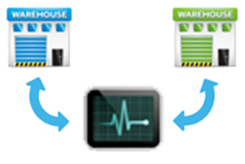EDI represents a set of standards, outlining specific formats for information that can be electronically exchanged between 2 parties - such as a distributor and it's vendors or a distributor and it's customers.
You may have heard the term “Electronic Data Interchange” (or “EDI”) being used around your office, warehouse, distribution facility, or even among your suppliers and competitors. But what does it mean exactly? EDI represents a set of standards, outlining formats for information that can be electronically exchanged between 2 parties. EDI is used in companies for many reasons. For example, it allows for easy communication between locations, it helps track and update inventory, and can even be used to transmit financial information and payment in electronic form (Electronic Funds Transfer or EFT).
While it may seem cumbersome to follow this set of guidelines, EDI can provide many benefits to your company, especially if it is properly integrated into a robust ERP system. When searching for an ERP solution to manage your inventory and accounting needs, look for something that can facilitate integration with EDI translation services. This integration will allow the import and export of transactions between your ERP system and approved EDI service providers. The use of EDI and proper ERP-EDI integration has many advantages for your business:
- Automation: EDI-based transactions communicate the same information as paper-based transactions, but they involve far less human intervention. For example, if a sales order is received through EDI, the vendor will not need to key in the customer’s information and manually update inventory – this will be done automatically.
- Greater flexibility: EDI allows companies to more easily work with electronic customer data, such as vendor tracking, purchases and returns, shipping, and inventory count.
- Reduced labour costs: Given the automation that comes hand-in-hand with EDI, the amount of manual processing that occurs in companies will decrease. This will, in turn, reduce labour costs.
- Increased production and performance: Using EDI means that errors through manual data entry will be eliminated, information will be stored electronically and will be easily accessible, and invoicing can be done 24/7. In the longer term, staff performance can be tracked and improved.
- Product can be moved faster: Automation means that orders are processed more quickly, allowing orders to be filled and transactions to be closed much faster.
Being able to follow EDI standards can put your company in a great position to take advantage of various opportunities. Stay tuned for Part 2 of this article to find out more about this, and read some advice from industry expert and VL Omni owner, Robin Smith, for business looking for an EDI solution.










